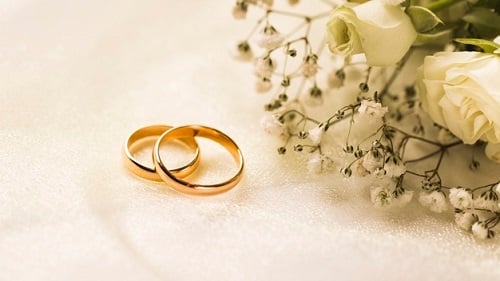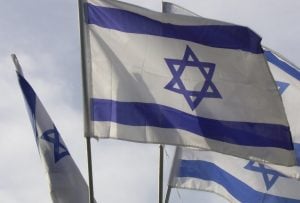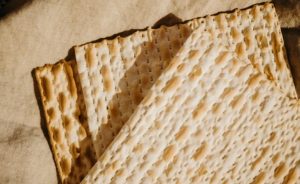At some point, your significant other finally realized that beyond a doubt, you were “The One.” He went out, bought you a stunning, sparkling ring that made you swoon as you said ‘yes’, and the next thing you knew, all your girlfriends were giggling about how lucky you are to get such a gorgeous ring. Now, you and your amazing hubby-to-be are getting down to planning the perfect wedding extravaganza, and one night, you decide to make a date out of looking for wedding rings. After searching high and low for the right ring to seal the deal and wear forever, something finally catches your eye – it’s truly spectacular and so perfect that you’re saying yes to it on the spot, but before you can get around to buying it, an unwelcome thought pops into your head: Will this ring be considered a kosher wedding ring that I can use for my traditional Jewish wedding ceremony???
If you’re not sure what the answer is, don’t panic. Just take a deep breath and relax because in this article, we’ll be exploring all the rules and facts of the Jewish Wedding Ring so keep on reading to find the answers to all your questions!
The History of Wedding Rings in a Jewish Marriage Ceremony
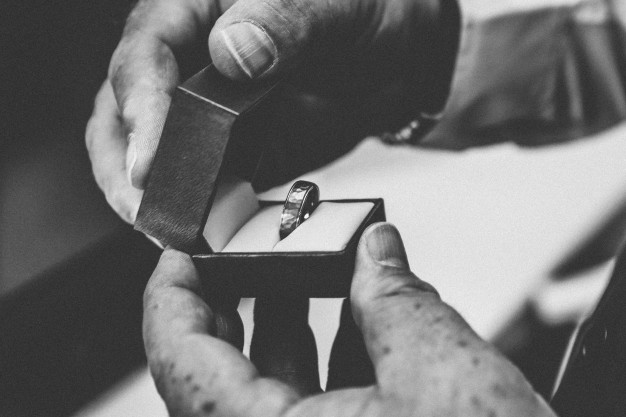 Given how fundamental the wedding band is in a traditional Jewish wedding ceremony, it may come as a surprise to you that Jews didn’t always use a ring when getting married. In fact, since Jewish law stipulates that a groom must only give his bride something “whole and of value;” for many centuries, Jewish men would solemnize their intentions to marry a woman by giving their beloved a coin that was worth a least a prutah – the ancient equivalent of a modern penny. Yet as time wore on, Jewish customs changed and it is thought that by the early Middle-Ages, Jews had adopted the tradition of using a ring to validate marriages, probably from their non-Jewish neighbors, and as a result of this, the ring became an integral aspect in every Jewish wedding. However, as this tradition was embraced from other cultures and did not have the typical biblical origin, medieval Jews consequently established specific guidelines on what makes a ring “kosher” to use under the Chuppah, and today, the majority of modern Jews still follow these rules regardless of their level of religiousness as most couples prefer a ring that conforms to traditional standards to use under the chuppah.
Given how fundamental the wedding band is in a traditional Jewish wedding ceremony, it may come as a surprise to you that Jews didn’t always use a ring when getting married. In fact, since Jewish law stipulates that a groom must only give his bride something “whole and of value;” for many centuries, Jewish men would solemnize their intentions to marry a woman by giving their beloved a coin that was worth a least a prutah – the ancient equivalent of a modern penny. Yet as time wore on, Jewish customs changed and it is thought that by the early Middle-Ages, Jews had adopted the tradition of using a ring to validate marriages, probably from their non-Jewish neighbors, and as a result of this, the ring became an integral aspect in every Jewish wedding. However, as this tradition was embraced from other cultures and did not have the typical biblical origin, medieval Jews consequently established specific guidelines on what makes a ring “kosher” to use under the Chuppah, and today, the majority of modern Jews still follow these rules regardless of their level of religiousness as most couples prefer a ring that conforms to traditional standards to use under the chuppah.
What Are The Requirements For A Kosher Jewish Wedding Ring?
 For a ring to be considered kosher for a Jewish wedding, it must first meet certain criteria:
For a ring to be considered kosher for a Jewish wedding, it must first meet certain criteria:
- Made from a “pure” metal – Jewish wedding rings have to be made from a single type of valuable metal and can’t be plated with another material. This means that gold-plated, rhodium-plated, or platinum-plated jewelry is not permitted, but rings made from pure sterling silver are. There is even a custom among some Jews to use a silver wedding band as this metal has been used since antiquity for currency. Other popular metals for Jewish wedding rings include 14k and 18k yellow, rose, or white gold and platinum. People opting for white gold bands should be careful when buying them as white gold is almost always commercially plated with rhodium in order to give it a brighter, more ‘white’ finish. Unplated white gold will have a slightly yellow tinge to the metal so it’s fairly easy to tell whether a white gold ring has been plated. Pro Tip: If you’re buying a white gold ring from an in-store jeweler that will be crafting your order according to your measurements, you can request that they hold off plating your ring until after your wedding ceremony. Most Israeli jewelers do this automatically for wedding rings, but if you live outside of Israel, you might need to ask the artist to make a note not to plate it. If you want to get your ring plated after, many jewelers will be happy to offer optional metal plating later.
- Value – The reason why a Jewish wedding ring cannot be plated with another metal is that the ring’s value needs to be easily ascertained. As we mentioned earlier, Jewish men previously gave their prospective brides a coin that was worth a minimum of a prutah, therefore, in order to qualify as kosher, a wedding ring must be worth at least that much. Since gemstones or metal plating can alter the value of the ring, therefore neither are permissible, though both may be added to the ring later if desired.
- Design – A Jewish wedding ring is traditionally smooth and unadorned, but as long as it does not have any gemstones or pierced designs, the ring can be considered kosher. This means that hammered, carved, engraved, or textured rings are perfectly permissible, so if this is the kind of style you prefer, you should be fine, although if you have doubts about the validity of the ring you have chosen, you should ask your rabbi just to be safe.
- Ownership – lastly, the final requirement for a ring to be kosher is that it must belong to the groom. He must have bought it with his own money and neither his parents nor the bride should pay for this ring. The ring needs to be his unconditional gift to her.
Giving the Ring to the Bride
There are two steps to a traditional Jewish wedding: the Kiddushin, or the Betrothal ceremony, followed by the Nissuin, which is the actual marriage service where the Sheva Brachot, the seven marriage blessings, are recited. Both rituals happen beneath the Chuppah canopy.
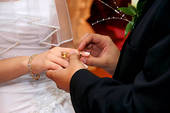
Once the bride and groom walk down the aisle and meet each other under the Chuppah, typically, blessings are made over wine and the groom begins the Kiddushin ritual by taking out his ring, which he presents to his bride, and says the words, “Harei Aht M’Kuddeshet Li, B’Taba’at Zo, K’Dat Moshe V’Yisrael,” which means, “Behold, with this ring, you become precious to me according to the laws of Moshe and Israel.” After reciting this verse, the groom slips the ring onto the pointer finger of the bride’s right hand and with that, the Kiddushin part of the wedding ceremony is complete.
Later, if the bride wants to, she can move her ring to another finger, which is what most brides do choose to do as many women prefer to wear their ring on their left hand next to their engagement rings.
The Symbolism of a Traditional, Simple Jewish Wedding Ring
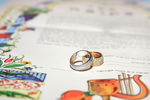
In some Jewish circles, there is a belief that the plainer the wedding ring, the better for the couple’s marriage. The basis of this tradition, which is Kabbalistic in origin, is the idea that a simple ring without gemstones or ornamentation is preferable as a smooth band is essentially a straightforward circle without any break, indentation, or distracting adornments, therefore symbolically, it represents a marriage that shall hopefully be as smooth and as uncomplicated as the wedding ring.
For this same reason, even though it is acceptable to use a ring that has some embellishment, plenty of Jewish couples wait to get their rings engraved until after the Chuppah ceremony as engravings can potentially collect dirt and dust, therefore if one chooses a plain, unadorned band made from gold or silver over these more elaborate options, they will be less likely to need cleaning as the band will be perfectly smooth without any crevices to attract dirt or particles.

Ultimately, while there may seem to be a lot of rules on Jewish wedding rings and how they must look, at the end of the day, there is a lot of flexibility that allows couples to have the freedom to choose a ring that speaks to their sense of style and taste. This is obviously important considering that most couples view their wedding ring as a symbol of their lifelong commitment and love, and most will treat it as a permanent reminder that they are devoting the rest of their life to this other person, so they will have to love it and want to wear their ring.
These days, wedding ring shopping has become a major milestone in every engaged couple’s relationship, so once you and your loved one decide to embark on this special and memorable journey, remember to enjoy it, and if you’re looking to keep things traditional, remember to follow these guidelines on choosing a kosher Jewish wedding ring and everything will be great!
Mazal Tov and good luck!
Judaica Webstore
